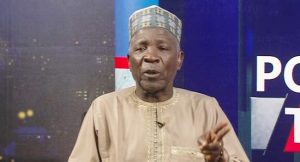Former National Secretary of the Congress for Progressive Change (CPC), Buba Galadima, believes President Muhammadu Buhari will not sign the amended electoral bill which currently awaits his assent.
Galadima, who made this comment on Wednesday during a television interview, said Nigerians and the National Assembly should not be deceived into believing that what will be assented to is in the citizen’s best interest. According to the elder statesman, if Buhari “signs any electoral bill with reservations, it means he has not signed the electoral bill”.
“This bill before Buhari contains the views of the representatives of the people; he has no choice,” Galadima said during the current affairs show.
The former spokesman for the presidential campaign council of the Peoples Democratic Party (PDP), said Buhari proved him right by not signing the bill when it was earlier sent. He added that the only reason the president is now willing to sign the bill is that the press and civil society organizations are mounting pressure on him. Be that as it may, Galadima believes that the presidency is playing some tricks.
“They are doing a kind of 419, he will sign the bill and send a list of things he doesn’t like which will secretly be passed for him and we are in it. There will be no change even if he signs because what he gives us with the right hand, he will take from us with the left,” he said.
“For you, he has assented to the amended 2010 Electoral Act but in the real sense of it, he will take whatever gains the people had put into the electoral act.”
Galadima’s comments come a few hours after the signing of the re-worked Electoral Act Amendment Bill scheduled for Wednesday was moved to Friday, February 25. A source close to the Presidency, who had earlier indicated that the President would assent to the bill on Wednesday, confirmed the new date to our correspondent. According to the source, the new date will be honoured by the President.
On January 25, lawmakers in the Senate and House of Representatives chambers of the National Assembly passed the harmonised version of the bill. The harmonised version was received by President Buhari a week later, as confirmed by his Senior Special Assistant on NASS Matters (Senate), Senator Babajide Omoworare.
He withheld his assent to the bill in November 2021, citing the cost of conducting direct primary elections, security challenges, and possible manipulation of electoral processes by political players as part of the reasons for his decision.
But the President gave some conditions to give his assent – an action that prompted the lawmakers to re-work the bill, leading to the emergence of two versions in the green and red chambers. The House had re-amended the bill to include the direct and indirect primary options while the Senate re-adjusted it to include the direct, indirect, and consensus modes of selecting political parties’ candidates.
Both chambers later passed the harmonised version – the final agreed version of the amendment to Clause 84 which included the direct, indirect, and consensus primary modes. Amid an outcry from critics, who raised concerns about the delayed signing over fears that the President might reject the bill again, a presidential aide, Femi Adesina, said his principal’s action was within the requirements of the law.
He stated that it would only be appropriate to say President Buhari has acted against the law if he exceeds the 30-day window provided by the Constitution to take a decision on the bill.


